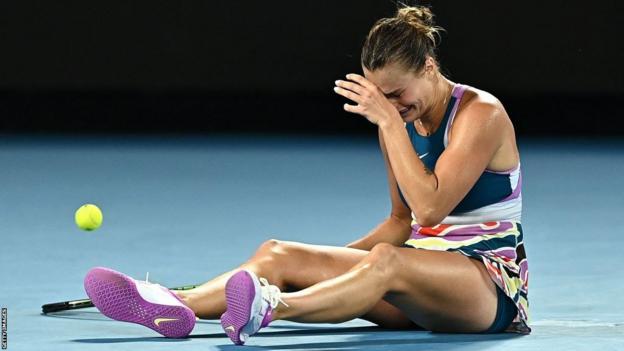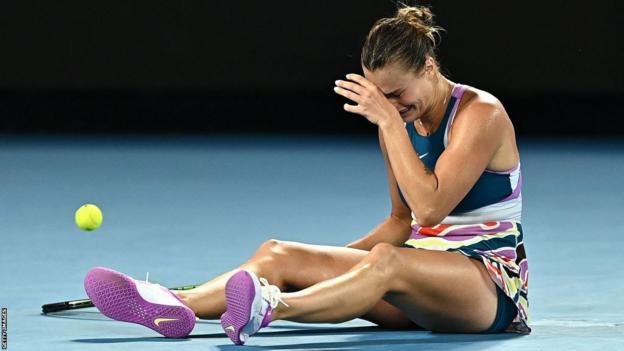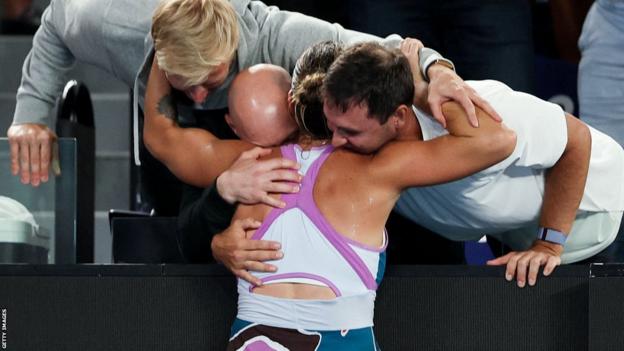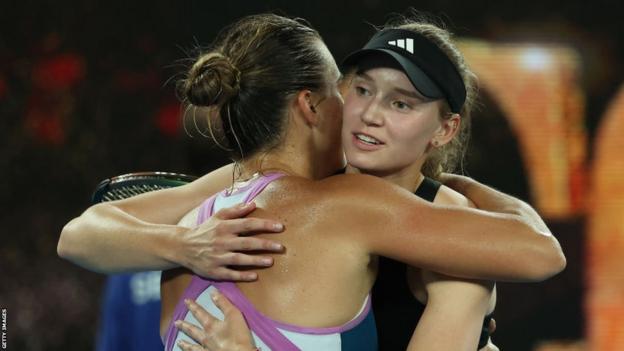Australian Open 2023: Aryna Sabalenka beats Elena Rybakina to win Melbourne title
Aryna Sabalenka wins her first Grand Slam singles title by fighting back to beat Elena Rybakina in the Australian Open final….


| Venue: Melbourne Park Dates: 16-29 January |
| Coverage: Commentary every day from 07:00 GMT on BBC Radio 5 Sports Extra ‘Tennis Breakfast’ live from Melbourne, with selected live text commentaries and match reports on the BBC Sport website & app |
Belarusian fifth seed Aryna Sabalenka won her first Grand Slam singles title by fighting back to beat Elena Rybakina in the Australian Open final.
In an absorbing contest which showcased the power of both players, 24-year-old Sabalenka triumphed 4-6 6-3 6-4.
Sabalenka, who won under a neutral flag because of Belarus’ support of Russia’s war in Ukraine, hit 51 winners as her high-risk game paid off in Melbourne.
Kazakhstan’s Rybakina was unable to add a second Slam to her Wimbledon title.
Instead it was Sabalenka who put her name on the exclusive list of people to win a major title as she fulfilled her long-seen potential.
Sabalenka could not convert her first three championship points – producing an edgy double fault, pulling a forehand wide and knocking a backhand long – but also held her nerve in between by saving a break point with a hefty unreturned first serve.
At the fourth opportunity, she finally got over the line when 22nd seed Rybakina hit a forehand long.
Sabalenka, full of elation and emotion, instantly fell to the court and covered her face as she cried in celebration.
After returning to her feet and hugging Rybakina, she walked over to her team for a celebration which also left her coach Anton Dubrov sobbing.

Sabalenka shows strength of character
A contest between two of the biggest hitters on the WTA Tour – billed as ‘power struggle of epic stature’ by one Melbourne newspaper – was always expected to provide explosive tennis.
And the pair produced exactly that in a high-quality final which did not disappoint.
Sabalenka has described how she could not face watching last year’s Wimbledon after being prevented from playing as a result of the ban imposed on Russian and Belarusian players.
To take her mind off the tournament, she spent more time in the gym but the key to her success in Melbourne has been down to the mind as much as the body.
Sabalenka had won all six of the Grand Slam matches last year where she lost the first set and again showed the strength of character – this time in the most pressurised of situations – to recover on Rod Laver Arena.
Fighting back was not something Sabalenka had been forced to worry about since arriving in Australia.
She had started the new season with a 10-match winning streak – leading her to the Adelaide title and then the Melbourne final – with all of those victories coming in straight sets.
Remodelling her serve in a bid to avoid the double faults which plagued her last year has proved key – as has her work with a psychologist.
This week she said she is now her “own psychologist” after stopping seeing the expert and showed her renewed self-belief as she overcame a wobble to finally clinch victory.
“I need a few days to realise what happened. I’m speechless,” Sabalenka, who had previously lost in three major semi-finals, told Australian broadcaster Channel Nine.
“It was super emotional at the end and I was super happy I was able to handle all the emotions in the last game. It was super tough.”
Rybakina shows she can back up success

Rybakina has been one of the most unheralded Wimbledon champions in recent history as a result of her low profile and a ranking that is artificially low because points were not awarded at the All England Club last year.
At Melbourne Park, the tall Kazakh – who was born in Moscow and represented Russia until she was 19 – has been reminding people once again of her outstanding talent.
Strong serving has been the bedrock of her success – leading the ace count in the women’s singles and having won 84% of her service games going into the final – and she dropped just six service points in the opening set.
However, Rybakina lost her serve once in each of the final two sets as the Belarusian – who continued with her front-foot approach – found her range.
That was enough for Sabalenka to turn the match around and prevent Rybakina holding half of the sport’s biggest prizes.
“It was a good year for me and hopefully next year I am going to have the same result and do even better,” she said.






